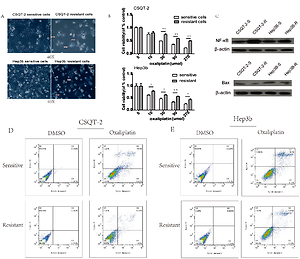Current issue
Archive
Manuscripts accepted
About the Journal
Editorial office
Editorial board
Section Editors
Abstracting and indexing
Subscription
Contact
Ethical standards and procedures
Most read articles
Instructions for authors
Article Processing Charge (APC)
Regulations of paying article processing charge (APC)
RESEARCH PAPER
All-trans Retinoic Acid combined with oxaliplatin suppressed proliferation of chemo-resistant hepatocellular carcinoma cells by inducing G2/M cell cycle arrest
1
Eastern Hepatobiliary Surgery Hospital, China
Submission date: 2020-03-26
Final revision date: 2021-08-01
Acceptance date: 2021-08-17
Online publication date: 2021-08-22
KEYWORDS
TOPICS
ABSTRACT
Introduction:
To investigate the effects and mechanisms of all-trans retinoic acid (ATRA) with and without oxaliplatin (OXA) on chemotherapy-resistant hepatocellular carcinoma cell lines.
Material and methods:
OXA-resistant cell lines (CSQT-2-R and Hep3b-R) and subcutaneous xenograft model were used in this study. MTT assay, flow cytometry, crystal violet assay, transwell assay and western-blotting were conducted to evaluate the effects of co-treatment with ATRA and OXA on OXA-resistant HCC in vivo and in vitro. The differences between two groups were analyzed using ANOVA. All statistical tests in the study were two-sided, and statistical significance was set at P<0.05.
Results:
We established two oxaliplatin-Resistant HCC cell lines (CSQT-2-R and Hep3b-R). The drug resistance ability can be increased up to 100% than their parental cells(CSQT-2 and Hep3b) in certain concentration of OXA. ATRA alone could not inhibited the viability of CSQT-2-R and Hep3b-R, but it can enhance the ability of OXA on apoptosis than OXA alone (75% vs 35%, p<0.05), which may be related to decreased p-AKT expression. Moreover, the co-treatment of two drugs arrest the cell cycle of OXA-resistant cell at G2/M phase by up-regulating CylinB1 protein.
Conclusions:
ATRA combined with OXA can elicit cell cycle arrest of CSQT-2-R and Hep3b-R at G2/M phase, thereby inhibiting the proliferation of resistant HCC cell, which provides a new treatment for chemotherapy-resistant HCC.
To investigate the effects and mechanisms of all-trans retinoic acid (ATRA) with and without oxaliplatin (OXA) on chemotherapy-resistant hepatocellular carcinoma cell lines.
Material and methods:
OXA-resistant cell lines (CSQT-2-R and Hep3b-R) and subcutaneous xenograft model were used in this study. MTT assay, flow cytometry, crystal violet assay, transwell assay and western-blotting were conducted to evaluate the effects of co-treatment with ATRA and OXA on OXA-resistant HCC in vivo and in vitro. The differences between two groups were analyzed using ANOVA. All statistical tests in the study were two-sided, and statistical significance was set at P<0.05.
Results:
We established two oxaliplatin-Resistant HCC cell lines (CSQT-2-R and Hep3b-R). The drug resistance ability can be increased up to 100% than their parental cells(CSQT-2 and Hep3b) in certain concentration of OXA. ATRA alone could not inhibited the viability of CSQT-2-R and Hep3b-R, but it can enhance the ability of OXA on apoptosis than OXA alone (75% vs 35%, p<0.05), which may be related to decreased p-AKT expression. Moreover, the co-treatment of two drugs arrest the cell cycle of OXA-resistant cell at G2/M phase by up-regulating CylinB1 protein.
Conclusions:
ATRA combined with OXA can elicit cell cycle arrest of CSQT-2-R and Hep3b-R at G2/M phase, thereby inhibiting the proliferation of resistant HCC cell, which provides a new treatment for chemotherapy-resistant HCC.
Share
RELATED ARTICLE
We process personal data collected when visiting the website. The function of obtaining information about users and their behavior is carried out by voluntarily entered information in forms and saving cookies in end devices. Data, including cookies, are used to provide services, improve the user experience and to analyze the traffic in accordance with the Privacy policy. Data are also collected and processed by Google Analytics tool (more).
You can change cookies settings in your browser. Restricted use of cookies in the browser configuration may affect some functionalities of the website.
You can change cookies settings in your browser. Restricted use of cookies in the browser configuration may affect some functionalities of the website.



